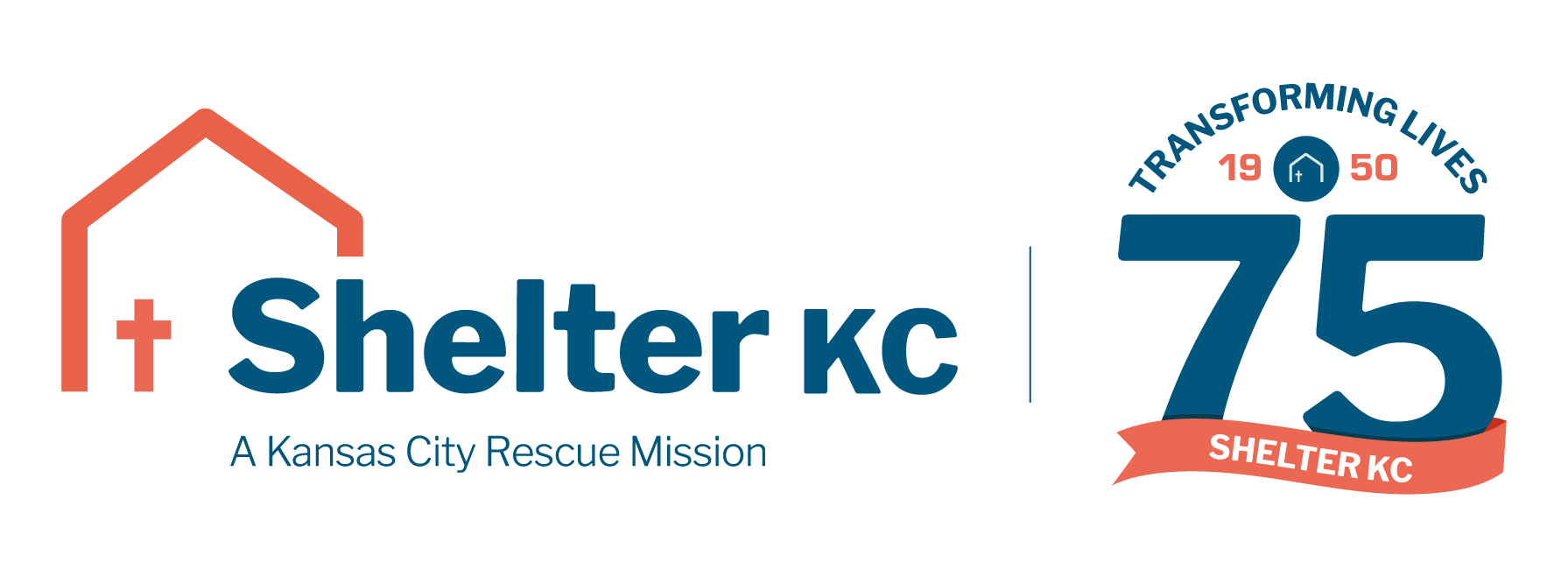Church Partnerships: Serving Together in Christ
At Shelter KC, we are a Christ-centered organization, and we welcome church groups to partner with us through volunteering. We believe that serving together strengthens the bonds within our community while sharing God’s love with those in need. If your church is interested in volunteering, we invite you to fill out our volunteer interest form. Our Volunteer Coordinator will carefully review your group’s information and help connect you to the service opportunities that best align with your group’s skills and passion for ministry.
Shelter KC Opportunities Through Church Partnerships
There are many ways to support, including in-kind donations, volunteering your time, organizing collection drives for immediate needs, having Shelter KC speak at your church or event, and more.
Shelter KC has been serving people in need since 1950. No matter the reason, we welcome those who are poor, homeless, hungry, and hurting into our doors with open arms. The shelter provides hot meals, safe housing, clean facilities, and services to the Kansas City homeless population. Our values and beliefs align with faith-based organizations looking for serving opportunities.

Much of our support comes from the helping hands of Christian volunteer groups like yours and for that, we are truly grateful! Your efforts will help Shelter KC in our mission to offer freedom, support, and resources to those in need, empowering them to reach their full potential.
Ways to Partner with Shelter KC
We’re grateful to receive funding from several church partners who allocate funds for Shelter KC out of their mission's budgets and/or special love offerings. Additionally, several churches host collection drives to fill our immediate needs, including new clothing, food, items for hygiene kits and more. We appreciate any and all gifts and put them to use - quickly!
Local Christian volunteer groups enjoy coming to our facilities to serve together. Our church volunteer program could involve cooking, serving meals, cleaning, or special projects to serve our clients. Church volunteer work availability is based on our calendar of events and current needs. Contact our Volunteer Coordinator, volunteer@shelterkc.org to schedule your church community service project with Shelter KC today.
We’re always open to partnering with churches that’d like to host events or activities for our guests. For example, one of our church partners took our Women’s Center guests kayaking and others have provided opportunities like tailgates for our men in recovery. If you have an idea in mind or a heart to serve in this way, contact us!
Our speakers bureau includes staff, volunteers, and guests who champion the ministry and can testify to what God is doing in people’s lives here! We love sharing stories of transformation and telling about the freedom from the past and hope for the future of our guests' experience. Contact us today for more information!
Statistics of Homelessness in Our Community
In Kansas City, homelessness affects thousands of individuals and families each year. Recent statistics show that:
- Over 2,000 people in Kansas City experience homelessness on any given night.
- 30% of those individuals are part of families with children.
- 20% are veterans, many of whom struggle with mental health challenges and addiction.
- Women experiencing homelessness often face increased risks of violence and exploitation.
These numbers reflect a deeper need for compassion and action in our city. By partnering with Shelter KC, your church can help bring hope, healing, and practical support to our neighbors in need.
Frequently Asked Questions
Learn more about ministry volunteer opportunities at Shelter KC.
To begin the process, fill out our volunteer interest form. Once submitted, our Volunteer Coordinator will review your information and help connect your group to the best opportunities that align with your skills and availability.
Church groups can assist in various ways, including:
- Serving meals to guests
- Sorting and distributing donations
- Organizing clothing drives
- Leading Bible studies or worship services
- Offering skills workshops (e.g., resume building, job training)
Our Volunteer Coordinator will work with you to match your group with the best available opportunities.
We can accommodate groups of different sizes. Please indicate the size of your group on the interest form, and we will tailor the opportunity to fit your needs. Whether it’s a small group or a larger congregation effort, we’ll find a meaningful way for your group to serve.
For most volunteer opportunities, Shelter KC will provide all necessary materials. However, for certain activities, your group may be asked to bring items. Our Volunteer Coordinator will provide all the necessary details ahead of time so your group can be fully prepared.
Yes! In addition to volunteering, we greatly appreciate donations of food, clothing, hygiene items, and financial contributions. Every donation helps us continue our mission of serving those in need. Click here to see our immediate needs.
For any additional questions or to discuss unique ways your church can get involved, please reach out to our Volunteer Coordinator.






